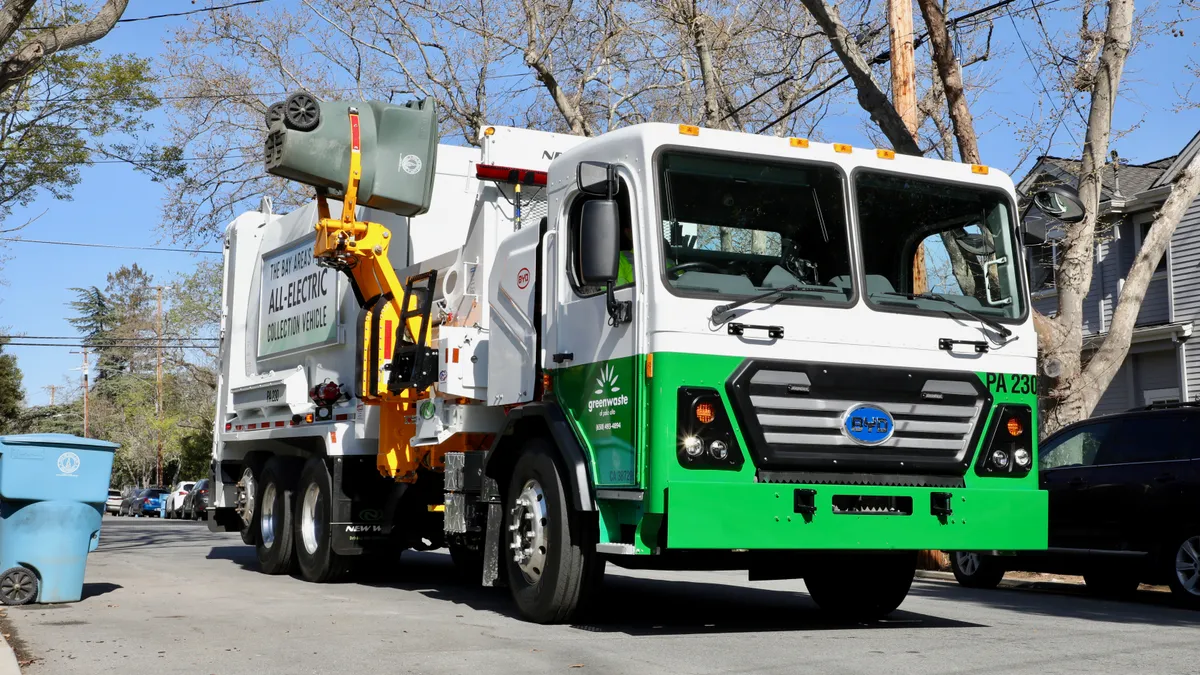Dive Brief:
- The Palo Alto, California, City Council voted on Monday to extend a three-month pilot with GreenWaste Recovery that sends more recyclables to domestic markets instead of international ones. It will work with GreenWaste to amend its hauling contract to run the program through fiscal year 2023.
- GreenWaste was unable to determine where some of its shipments ended up when exported, which its contract required. Concerned about the possible environmental impacts its recyclables could have when shipped internationally, Palo Alto began the pilot this spring that instead sends mixed paper to Pratt Industries in Louisiana and mixed rigid plastics to Envision Plastics or PreZero US in California.
- Palo Alto will budget up to $1.2 million to extend the program, though it’s not clear what the actual cost will be for GreenWaste to continue choosing domestic processors for the material long-term. City officials hope to make the arrangement permanent as more domestic capacity becomes available. The city initially budgeted $555,000 for Greenwaste to process its recyclables in 2022.
Dive Insight:
After China stopped accepting imports of many kinds of recycled commodities in 2018, recyclers in the U.S. began rethinking their strategy for managing the material. In California, some lawmakers and activists have called for the Biden administration to curb the export of low-value scrap plastic to developing countries by ratifying the Basel Convention, an international agreement that aims to ensure certain waste is handled responsibly. Others have shifted to finding more local markets.
Despite the pilot program’s price tag, Palo Alto sees it as a more manageable and accountable way to keep track of where its paper and plastic end up. The city drew criticism last year for renewing its hauling and processing contract with GreenWaste even though the company was not able to pinpoint how some of its exports were being managed or where, exactly, some of the material ends up. GreenWaste has been required since 2019 to give details on where its local recyclable material goes.
According to GreenWaste’s 2021 report, 61% of Palo Alto’s recyclables were sent to international markets such as India, Indonesia, Korea, Malaysia and other locations. However, “it is not possible to definitively determine whether the materials are being recycled properly or whether they may be causing environmental or social problems,” said City Manager Ed Shikada in a report to council members.
GreenWaste has said some brokers are unwilling to provide such information to protect trade secrets, while others simply don’t know the specifics of which plants receive which material after it leaves the ports. GreenWaste said its business and that of the brokers it works with “stand to be harmed” if the city pushes further traceability requirements due to “the current state of the markets.” The company also told Palo Alto in its 2020 traceability report that it completed an upgrade to its MRF in 2019, thus doing its part to reduce contamination. GreenWaste has not yet returned calls seeking comment.
In 2021, GreenWaste processed 14,000 tons of recyclable materials from Palo Alto, exporting 100% of the mixed paper along with about 90% of rigid plastic and 95% of cardboard.
Paula Borges Fujimoto, solid waste manager for the city’s Public Works Department, said Palo Alto so far has been satisfied with GreenWaste quickly identifying domestic alternatives for the rigid plastic and mixed paper since the start of the pilot, especially because competition for local processors can be stiff due to high demand and limited capacity.
“Our concern is [that] mixed paper can be more contaminated than some other grades, we’re not 100% sure what is happening to it when it’s shipped to international markets, and we can’t find 100% factual information about that,” she said.
When the pilot continues into 2023, the city estimates about 3,800 tons of mixed paper and 230 tons of mixed rigid plastics will be sent to domestic processors instead of international markets. About 41% of city’s total recyclable materials would still be exported.
Most of Palo Alto’s cardboard will continue to be exported, with only about 13% going to domestic markets, Fujimoto said. The city is less concerned about the fate of cardboard exports because the material generally has lower levels of contamination and has numerous buyers that highly value the material, she said. Much of the city’s PET and HDPE was already being recycled domestically, including at California processors.
Palo Alto hopes GreenWaste will be able to find additional domestic end markets throughout the rest of 2022 and into 2023 despite the tight competition. “We’re hoping this action will spur interest from recycling innovators and entrepreneurs. If Palo Alto is taking a stance on keeping it domestic, other communities will follow. For that to happen, we need more facilities to accommodate more materials from us,” Fujimoto said. As more facilities open, costs to process material domestically could decrease, offsetting the city’s extra costs to keep the material local, she added.
Palo Alto is the only city in California to require its recycling contractor to provide this level of detail on how its commodity exports impact the environment in countries that import the material, according to Fujimoto. Yet she said the decision may spur other cities to act, too. After learning how difficult it is to obtain such details, Palo Alto and other Bay Area cities are working with state Sen. Josh Becker on a potential bill that could require the tracking of recyclables from collection through final disposal.
“There are not enough regulations, there's not enough transparency with recyclable materials,” she said. “We're hoping that through these forums and talking to our colleagues, we can create more demand and interest in creating this transparency.”















